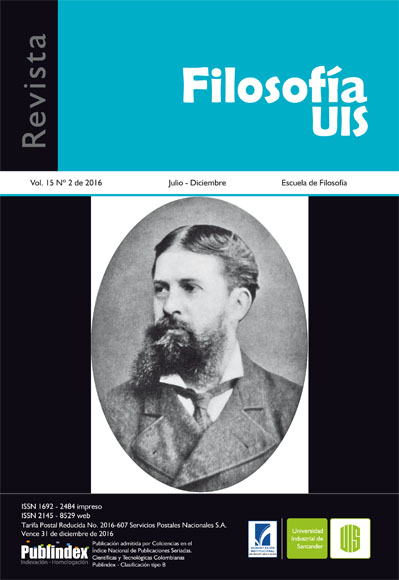Research Article
Thomas Hobbes: sedition and its neutralization by the citizenship education
Published 2016-11-30
Keywords
- Thomas Hobbes,
- history of modern philosophy,
- history of modern political philosophy,
- citizenship education,
- sedition
How to Cite
Jiménez Castaño, D. (2016). Thomas Hobbes: sedition and its neutralization by the citizenship education. Revista Filosofía UIS, 15(2), 15–36. https://doi.org/10.18273/revfil.v15n2-2016001
Copyright (c) 2016 Revista Filosofía UIS

This work is licensed under a Creative Commons Attribution 4.0 International License.
Abstract
The aim of this brief work is to analyze what Hobbes said about sedition in his political works. We will try to do it in three different sections: in the first one, we will see which are the ingredients that can cause sedition; and then, in the second, which are the characteristics of those who want to start a revolution and to achieve their goal. Finally, as conclusion, we’ll see that the only way to neutralize sedition is developing the citizenship education.Downloads
Download data is not yet available.
References
- Anderson, J. (2003). “The role of education in Political
- Stability”. Hobbes Studies, 16(1), 95-104.
- Bertman, M. A. (1997). “Justice and contra-natural
- dissolution”. Hobbes Studies, 10(1), 23-37.
- Bobbio, N. (1991). Thomas Hobbes. México: Fondo de Cultura Económica.
- Galimidi, J. L. (2002). “Victoria no es conquista: la evaluación hobbesiana de la guerra civil inglesa”. Deus mortalis. Cuadernos de Filosofía Política, (1), 55-92.
- Hobbes, T. (1992). Behemoth. Madrid: Tecnos.
- Hobbes, T. (2000a). De Cive. Madrid: Alianza.
- Hobbes, T. (2000b). Tratado sobre el Cuerpo. Madrid: Trotta.
- Hobbes, T. (2004). Leviatán. Madrid: Alianza.
- Hobbes, T. (2005). Elementos del Derecho Natural y Político.
- Madrid: Alianza.
- Johnston, D. (1986). The Rhetoric of Leviathan. Thomas
- Hobbes and the Politics of Cultural Transformation. New Jersey: Princeton Univerity Press. Lessay, F. (2000). “Droit de résistance et droit de rébellion dans l’Angleterre du XVIIe siècle: enjeux philosophiques et politiques”. Cahiers scientifiques de l’université d’Artois, (17), 75-94.
- Malherbe, M. (1996). “Hobbes et la Mort du Léviathan: opinion sédition et dissolution”. Hobbes Studies, 9(1), 11-20.
- Martinich, A.P. (1995). A Hobbes Dictionary. Oxford: Blackwell Publishers.
- Murphy, M.C. (1995). “Hobbes on Conscientious Disobedience”. Archiv für Geschichte der Philosophie, (77), 263-284.
- Nicastro, O. (1992). “Le Vocabulaire de la Dissolution de l’État”. Zarka, Y. Ch., Hobbes et son Vocabulaire. Paris: Vrin.
- Pettit, P. (2008). Made with Words. Hobbes on Languaje, Mind and Politics. New Jersey: Princeton Univerity Press.
- Skinner, Q. (1996). Reason and Rhetoric in the Philosophy of Hobbes. Cambridge: Cambridge University Press.
- Steinberg, P. J. (2002). “Hobbesian resistance”. American journal of political science, 46(4), 856-865.
- Watkins, J. W. N. (1972). Qué ha Dicho Verdaderamente Hobbes. Madrid: Doncel.
